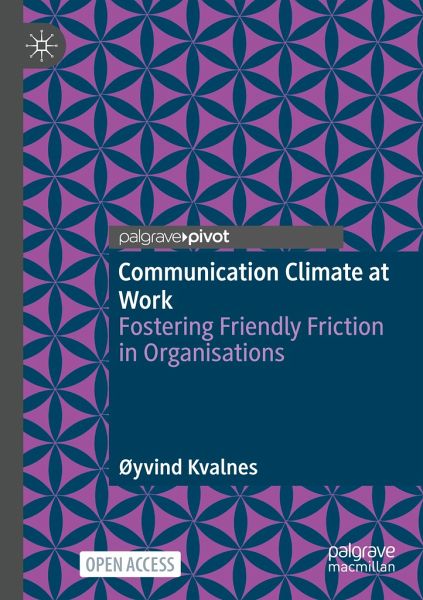
Communication Climate at Work
Fostering Friendly Friction in Organisations

PAYBACK Punkte
16 °P sammeln!
This book explores how members of an organization or group speak to and with each other. An expansion of the author's previous research on fallibility in organizations, the concept of communication climate is related to those of voice climate and psychological safety, both of which focus on the risk of speaking up and raising concerns at work. In this book the author addresses the scope for criticism, dissent and disagreement, but also for praise and encouragement. He places friendly friction at the core of what characterizes a healthy communication climate.Beginning with a clear explanation o...
This book explores how members of an organization or group speak to and with each other. An expansion of the author's previous research on fallibility in organizations, the concept of communication climate is related to those of voice climate and psychological safety, both of which focus on the risk of speaking up and raising concerns at work. In this book the author addresses the scope for criticism, dissent and disagreement, but also for praise and encouragement. He places friendly friction at the core of what characterizes a healthy communication climate.
Beginning with a clear explanation of how and why communication climate is important in organizations, the author introduces the concept of critical quality moments, i.e. situations where a verbal intervention can crucially change the course of events for the better. The book then goes on to describe seven elements that characterize well-functioning communication climates before exploring the concept of communication ethics, and the balance between freedom of speech on the one hand, and speech responsibility on the other.
Concluding with suggestions for further research, this book addresses issues that are at the core of establishing collaboration and excellence at work, making it highly relevant to executive students at business schools, researchers in organizational behavior and decision-makers in organizations.
This is an open access book.
Beginning with a clear explanation of how and why communication climate is important in organizations, the author introduces the concept of critical quality moments, i.e. situations where a verbal intervention can crucially change the course of events for the better. The book then goes on to describe seven elements that characterize well-functioning communication climates before exploring the concept of communication ethics, and the balance between freedom of speech on the one hand, and speech responsibility on the other.
Concluding with suggestions for further research, this book addresses issues that are at the core of establishing collaboration and excellence at work, making it highly relevant to executive students at business schools, researchers in organizational behavior and decision-makers in organizations.
This is an open access book.












